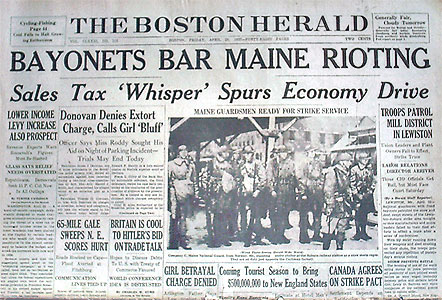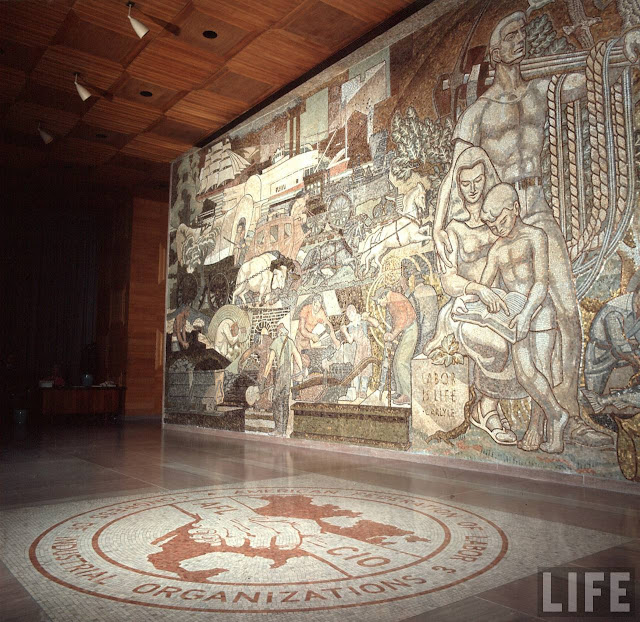John Buell
Author of Evil Doers: Demonization and the
End of Civil Debate in American Politics (NYU Press)
In 2007, a good friend of ours, Judy Taylor, won a competitive commission from the Maine Arts Commission and the Maine Department of Labor to present a visual montage of the history of labor in Maine. . Taylor collaborated informally with Maine’s preeminent labor historian, Charles Scontras of the Bureau of Labor Education at the University of Maine. In personal communication with the artist (and which both have generously shared with me) Scontras highlighted what might serve as an overarching theme for the mural: “Maine is a bit more than the stereotypical romantic images that have become commonplace and marketed by our gift and souvenir shops, i.e., Down-East humor, lighthouses, lobster fishermen, general stores with their pot bellied stoves and crackle barrels, its rock-bound seacoast, the rustic retreat for frustrated urbanites, larger than life lumberjacks, etc. While these things do describe Maine, and I am glad that they form part of our heritage, Maine was not Nirvana. The creative role of dissent, protest, conflict, and the demand for social justice in the workplaces of the state, form an integral part of our historical legacy.”
Judy used her family and friends as models in the 11 panels depicting scenes from Maine's labor history. Thus, the young college- aged daughter of friends became "Rosie the Riveter". Women’s tireless work building tanks, torpedoes, trucks and ships was critical to the war effort and to our final victory in World War II. Our daughter is seen in the panel depicting the Lewiston-Auburn Shoe factory strike of 1937. She is shown screaming with her arms raised as the police and National Guard are dragging the striking immigrant Franco-American women to jail.
My wife is Frances Perkins, whose parents were Maine natives. Frances Perkins, President Roosevelt's Secretary of Labor, was the first woman cabinet member and the longest serving cabinet member in American history. She helped create Social Security, the first Federal unemployment insurance, Federal laws abolishing child labor, standards for workplace safety, the first federally guaranteed minimum wage, and the 40 hour work week. To this day, our families and workplaces would be very different without the protections and programs that Perkins and her colleagues initiated and implemented.
Our governor is unimpressed. He ordered removal of this mural and renaming the department’s Perkins conference room on the grounds that these convey a one-sided view of Maine economic development. If the governor feels that all history and all art reflect a point of view, we can agree with him. The situations portrayed in the mural reflect historical facts but these particular facts were chosen to represent events that working men and women experienced as quantum changes in the quality of their lives. History is not a random collection of discrete facts. Nor is history static. The facts as individuals and as a society that we now choose to emphasize reflect and in turn influence our experience, our sense of right and wrong and our imagination. Art plays an essential role in expressing and amplifyng this creative dynamic.
Business already has more than ample resources to get its views across. There are whole networks, Fox and CNBC, devoted to promulgation of business views. In our increasingly pro-business media, counter arguments are shouted down and opponents demeaned and vilified Following the Supreme Court’s Citizens United decision, corporations are now legal persons that can spend unlimited sums on political advertising and image creation.
So, Governor Le Page, if we can’t have a mural like this at the Department of Labor, where will we learn about the benchmarks in Maine’s labor history? Why is “balance” limited to efforts to counter the few labor voices while business perspective go unchallenged?
The governor’s actions also reflect and intensify the dismissive, contemptuous style of the modern media. Not content with merely ordering removal of the mural, the governor had it removed over a weekend in the cover of darkness to obviate any public protest. His actions are painfully reminiscent of authoritarian efforts to shape politics through the control of art.
Progressive critics of the governor should advocate more support—including financing for-- art from a variety of political and religious orientations. Business itself should be encouraged to develop its own art, but in the process it might also become clear that business is not a monolith. The US Chamber of Commerce claims to speak for all, but often articulates only the perspective of the largest and most government pampered multinationals.
We should counter the Fox mindset not merely with different politics but with a more respectful, less hubristic political style. We must of course advocate and defend the effectiveness of some immediate reforms. The world is not utterly chaotic and some domains or markets would still respond to fiscal stimulus and simple reforms in relatively predictable ways. But order and stability often make possible new disequilibrium and even harmonious systems encounter disruptions from other complex systems. None is as self-contained or autonomous as some would like to argue. Earthquakes, climate change, and inordinate and expanding bubbles all threaten major disruptions in “self-regulating” markets. (The case for a world that cannot be confined within static and predictable harmonies is lent plausibility, though no proof is claimed, in William Connolly’s AWorld of Becoming, which provocatively expands on and articulates political and ethical implications of recent developments in complexity theory, neuroscience, and philosophy.)
How do we respond to such a world? Cling to ultimate faith in the eventual triumph of the “free market’ or to a providential and all powerful God? Surely these conventional voices deserve their hearing. Some progressives, however, want to “remove religion from politics.” And hope the facts will speak for themselves.This is neither fair nor effective. Even progressives’ short-term reforms are premised in part of some fundamental moral values and facts absent passions or commitments may not motivate.
Progressives and liberal advocates of a more just and inclusive society of all stripes and backgrounds should articulate the fundamental religious and philosophical ideals that influence and inspire their politics even as they acknowledge the inability to fully demonstrate their truth to the satisfaction of all. In the process collaboration among secular liberals, peace and environmental justice groups, feminist organization, immigrant rights groups, native Americans. Civil rights groups, social justice Catholics, liberal Muslims, and Jews can grow through mutual willingness to debate core values and recognition of shared vulnerabilites. At a minimum, this process can strengthen and be strengthened by a commitment to oppose efforts by any group to close debate or suppress protest. More broadly it may facilitate development of shifting coalitions around positive reconstruction of the political economy.
Broader and more systemic reconstitution of workplaces, the media, and consumption patterns aimed at redressing the complex social, cultural, and economic origins of serious disequilibrium such as huge wealth disparities, massive hunger, unprecedented climate disruption can be suggested.
In the context of such basic changes, however, we should acknowledge the continuing possibility of unintended consequences, new and unforeseen rights claims, and our limited ability to predict and control the future. My faith is that such openness to differing fundamentals, tentative and experimental policy responses, and sensitivity to new claims is the best way to prevent anarchy or tyranny in a rapidly morphing world. My (perhaps utopian) hope is that it might even evoke reciprocal moves among, at least, the less rigid devotees of Fox and the Tea Party.
Right now, however, we must stand firm against censorship and the effort to crush any pro-labor perspective, endeavors that are occurring in many forms across the nation. Rather than expanding debate, these efforts are intended to prevent any labor perspective from arising from the ashes.
Instead of taking Frances Perkins’ name off of a room, we should be erecting statues to honor her and other Maine labor leaders. My wife was proud to stand in for Frances Perkins in the Department of Labor's History of Maine Labor mural. The mural should be returned to the Department of Labor, where it can serve all Maine citizens.

















0 comments:
Post a Comment